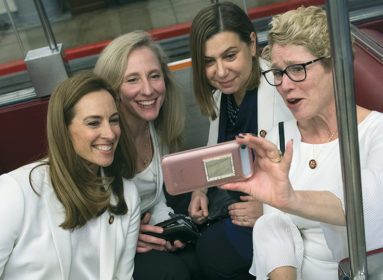
A Stamford Jewish educator talks about her role in designing new models in Jewish education on a national scale.
By Stacey Dresner
In May the Jewish Education Innovation Challenge (JEIC) convened nearly 100 Jewish educators and community leaders from across North America to participate in “Oases of Change,” its 5th annual Innovators Retreat, at the John F. Kennedy Presidential Library and Museum in Boston, Mass.
Among the educators in attendance was Michal Smart, associate principal of Judaic studies at Bi-Cultural Day School in Stamford.
Smart was one of 10 members of the JEIC HaKaveret Design Team, all educators at day schools or Jewish education organizations, who were brought together last October to develop innovative and engaging new models in Jewish education.
The Innovators Retreat in Boston showcased 11 revolutionary ideas in Jewish day school education and opened them up for feedback from top educators, funders and social entrepreneurs in the field. Besides the group of 10 designers, the retreat also featured presentations by the 2017 grantees of the JEIC Educators’ Challenge: the Fuchs Mizrachi School in Beachwood, Ohio, and Akiba-Schechter Jewish Day School in Chicago, Illinois. Each school received a $50,000 grant to pilot-test their model in their schools over a two-year period.
The Innovators Retreat included breakout sessions where attendees had the opportunity to critique the models presented by both the 2017 grantees and the HaKaveret Design Team.
“The educational prototypes created by this dedicated group will empower students to embrace Jewish learning as a relevant guide for meaningful living in the 21st century,” explained Rabbi Shmuel Feld, rounding director of JEIC. “We plan to test these models in existing schools, and the successful plans will be adapted, improved and shared with the Jewish educational community.”
Smart holds degrees in religion from both Princeton University and Cornell University and is a graduate of the Wexner Fellowship Program. A Fulbright Scholar in Jewish Thought, she also was a fellow in the Melton Senior Educators Program at the Hebrew University of Jerusalem.
The recipient in 2015 of an Excellence in Jewish Education Award from the Harold Grinspoon Foundation, Smart has an extensive background as an educator and an administrator. She has been at the forefront of Jewish outdoor and environmental education, serving as executive director of Camp Isabella Freedman and as director of education of the Coalition on the Environment and Jewish Life. A founder of the TEVA Learning Center, an award-winning program that integrates Jewish education, community-building and ecological sustainability, Smart is co-author of Spirit in Nature: Teaching Judaism and Ecology on the Trail.
When Smart arrived at Bi-Cultural four years ago, she says she realized it is not a “one-size-fits-all” school. She and her staff developed Masora, a new middle school Judaic studies program option for Judaic studies. They also introduced a Hebrew language Ulpan, focused on spoken language and everyday scenarios, and a text-based Matmid program that balances the acquisition of skills with the conveyance of content and meaning of religious texts. They are currently partnering with Ayeka, an organization that provides educators with the pedagogical tools to deepen students’ Jewish and spiritual identities. Through this program Smart and her team are bringing “soulful education” into the Judaic studies classroom.
Smart recently spoke with the Jewish Ledger about her work as a member of the HaKaveret Design Team and her participation at the Educators Innovation Retreat in Boston.
Jewish Ledger (JL): What was the goal of the Jewish Education Innovation Challenge?
Michal Smart (MS): The Mayberg Foundation launched the Jewish Education Innovation challenge to encourage day school educators to think outside the box and experiment with new models of education. Bi-Cultural was honored to receive the JEIC award for our Masora program in 2015. This was my first introduction to the JEIC.
JL: You were selected as a HaKaveret: Team Challenge “designer.” As such, what was your mission?
MS: This year, the JEIC adopted a new approach to fostering innovation – the selection of 10 innovative educators to work together as a design team with JEIC support. Our mission was to identify key challenges in day school education and then imagine radically new ways to structure schools, design curricula, train teachers, and/or shape classroom instruction that might successfully address them. Bi-Cultural Day School is committed to innovation and proud to be part of this process, so I felt supported in my work.
JL: How did you manage to work as a “team,” given that team members were spread throughout the country?
MS: The JEIC gathered our whole group together for three multi-day working retreats throughout the year. Once we were split into working groups, each with a specific project, those working groups met “virtually” on a weekly basis and also spoke regularly with our coach from the JEIC staff.
The first two retreats were devoted almost entirely to articulating a shared understanding of the Jewish educational landscape and the challenges we collectively face. Then the fun part began – brainstorming new approaches and possible models for development. It was thrilling to be in the room with such gifted and visionary educators, all sharing ideas and imagining new possibilities together.
JL: The design group came up with several educational prototypes. Can you tell us about one that would be of particular interest to you or that you were especially invested in?
MS: While I think everyone in our group feels invested in each of the prototypes we developed, we each worked intensively on just one of them. While we worked primarily in dyads, I was blessed with the opportunity to work with two incredibly talented educators – Rina Hoffman and Tikvah Weiner. We developed a prototype for an “Inquiry Beit Midrash” – a semester-long program of Judaic studies for middle or high school students.
Our model starts by helping each student identify a personal interest, passion or concern and to generate a specific line of inquiry. Teachers then identify traditional Jewish texts, and perhaps historical and/or contemporary sources as well, that provide insight into Jewish perspectives on each student’s question. Each student can follow his or her own curiosity and evolving interests. Finally, the Torah study is brought into the world with a final project that not only demonstrates what students have learned, but also directs that learning towards their own personal growth, the education of others, and/or the betterment of the world. In this way, we model one aspect of what it means to be a Jewishly engaged person.
JL: What was it like being at the JEIC retreat with 100 like-minded Jewish educators from all across North America?
MS: This was my third JEIC retreat, and each one has been amazing. There is so much talent, commitment, and excitement in the room. The JEIC is honest, courageous and visionary and that is a wonderful place to be! I leave each retreat inspired.
JL: Tell us about the presentation HaKaveret designers made at the retreat.
MS: This year, the HaKaveret designers not only presented our models to everyone assembled, but we also got the chance to “test drive” them in smaller groups of about 25 people. This was super fun, as we not only had our first opportunity to share our model with actual “students,” but also received valuable feedback, important challenges, and great suggestions from a very insightful group of people.
JL: What happens now? Will you implement any of the models or things you learned through your JEIC experience at Bi-Cultural?
MS: It has been a privilege to participate in the JEIC’s school challenge and HaKaveret design team. At Bi-Cultural, we will be piloting the Inquiry Beit Midrash program already next year. Baruch Hashem (God willing), this work will impact day schools across the country in a positive and inspiring way.
CAP: Michal Smart (center) and her team presenting at the 2017 Jewish Education Innovation Challenge retreat.







 Southern New England Jewish Ledger
Southern New England Jewish Ledger
















